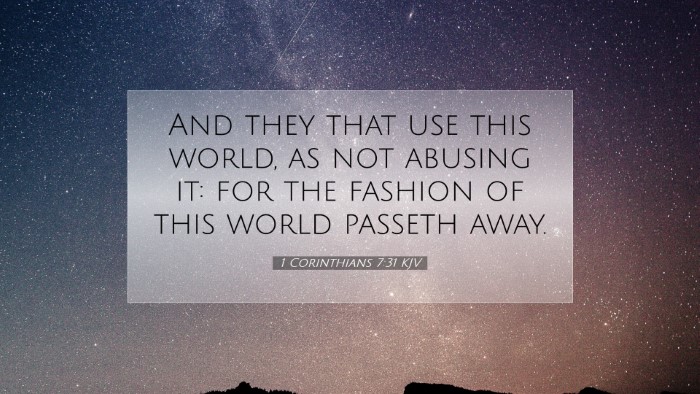Old Testament
Genesis Exodus Leviticus Numbers Deuteronomy Joshua Judges Ruth 1 Samuel 2 Samuel 1 Kings 2 Kings 1 Chronicles 2 Chronicles Ezra Nehemiah Esther Job Psalms Proverbs Ecclesiastes Song of Solomon Isaiah Jeremiah Lamentations Ezekiel Daniel Hosea Joel Amos Obadiah Jonah Micah Nahum Habakkuk Zephaniah Haggai Zechariah MalachiVerse
1 Corinthians 7:1 1 Corinthians 7:2 1 Corinthians 7:3 1 Corinthians 7:4 1 Corinthians 7:5 1 Corinthians 7:6 1 Corinthians 7:7 1 Corinthians 7:8 1 Corinthians 7:9 1 Corinthians 7:10 1 Corinthians 7:11 1 Corinthians 7:12 1 Corinthians 7:13 1 Corinthians 7:14 1 Corinthians 7:15 1 Corinthians 7:16 1 Corinthians 7:17 1 Corinthians 7:18 1 Corinthians 7:19 1 Corinthians 7:20 1 Corinthians 7:21 1 Corinthians 7:22 1 Corinthians 7:23 1 Corinthians 7:24 1 Corinthians 7:25 1 Corinthians 7:26 1 Corinthians 7:27 1 Corinthians 7:28 1 Corinthians 7:29 1 Corinthians 7:30 1 Corinthians 7:31 1 Corinthians 7:32 1 Corinthians 7:33 1 Corinthians 7:34 1 Corinthians 7:35 1 Corinthians 7:36 1 Corinthians 7:37 1 Corinthians 7:38 1 Corinthians 7:39 1 Corinthians 7:40

